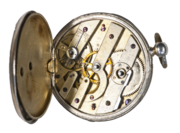
Back المركز للعلم والثقافة Arabic Center for Science and Culture Spanish Center for Science and Culture ID Center for Science and Culture Italian Centro para Ciência e Cultura Portuguese
 | |
| Founded | 1996 |
|---|---|
| Type | Non-profit |
| Focus | Promote intelligent design |
| Location |
|
| Owner | Discovery Institute |
Key people | Stephen C. Meyer |
| Employees | 8 staff[1] |
| Website | www |
| Part of a series on |
| Intelligent design |
|---|
 |
| Concepts |
| Movement |
| Campaigns |
| Authors |
| Organisations |
| Reactions |
|
|
| Creationism |
The Center for Science and Culture (CSC), formerly known as the Center for the Renewal of Science and Culture (CRSC), is part of the Discovery Institute (DI), a conservative Christian think tank[2] in the United States. The CSC lobbies for the inclusion of creationism in the form of intelligent design (ID) in public-school science curricula as an explanation for the origins of life and the universe while trying to cast doubt on the theory of evolution.[3] These positions have been rejected by many in the scientific community, which identifies intelligent design as pseudoscientific neo-creationism, whereas the theory of evolution is the accepted scientific consensus.[4]
The Center for Science and Culture serves as the hub of the intelligent design movement. Nearly all of prominent proponents of intelligent design are either CSC advisors, officers, or fellows. Stephen C. Meyer, a former vice president of the Discovery Institute and founder of the CSC, serves as a Senior Fellow, and Phillip E. Johnson was the Program Advisor. Johnson is commonly presented as the movement's "father" and architect of the center's Wedge strategy and "Teach the Controversy" campaign, as well as the Santorum Amendment.
- ^ "Fellows". Center for Science and Culture. Seattle, WA: Discovery Institute. Retrieved 2014-05-15.
- ^ "Intelligent Design: Creationism's Trojan Horse - A Conversation With Barbara Forrest". Church & State (Unabridged interview). Washington, D.C.: Americans United for Separation of Church and State. February 2005. ISSN 2163-3746. Archived from the original on 2014-05-17. Retrieved 2014-05-16.
Patricia O'Connell Killen, a religion professor at Pacific Lutheran University in Tacoma whose work centers around the regional religious identity of the Pacific Northwest, recently wrote that 'religiously inspired think tanks such as the conservative evangelical Discovery Institute' are part of the 'religious landscape' of that area.
- ^ Forrest, Barbara (May 2007). "Understanding the Intelligent Design Creationist Movement: Its True Nature and Goals" (PDF). Center for Inquiry. Washington, D.C.: Center for Inquiry. Archived from the original (PDF) on 2019-02-14. Retrieved 2014-05-16.
- ^ Delgado, Cynthia (July 28, 2006). "Finding the Evolution in Medicine" (PDF). NIH Record. 58 (15). Bethesda, MD: National Institutes of Health: 8. ISSN 1057-5871. Retrieved 2014-05-16.
...99.9 percent of scientists accept evolution...